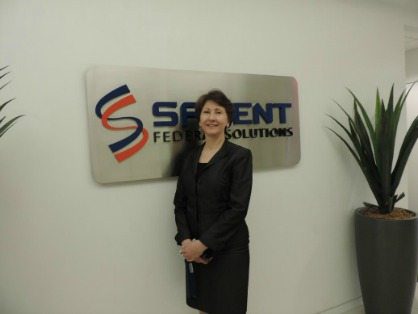
Cynthia Walker of Salient Federal Solutions, discussed her new position as director of the company’s Data Analytics Center of Excellence (DACoE) in Fairfax, in a recent interview with WashingtonExec.
Appointed to the position in March, Walker is responsible for the company’s overall data analytics strategy, to include expanding the center’s market distinctions and adding innovations such as predictive analytics, agile business intelligence and big data solutions for clients. Her initial focus on current client engagements allows her to help clients exploit their existing data assets for greater mission impact right away.
“I’m excited to share the passion that I have for collecting raw data and demonstrating the value that data can offer our client said Walker, who will speak April 27 – May 1 at the Enterprise Data World in Austin, Texas.
On April 30, she’ll present, “Combining Traditional Enterprise Data Management Best Practices with Semantic Approaches and Technologies for Business Agility” at the event, which will focus on big data, data governance and stewardship, new database technologies and agile data management.
Walker explained that Salient’s DACoE provides the full spectrum of data analytics services, and collaborates closely with the company’s cyber security, mobility and agile software development CoEs.
“I like to say that big data brings big obstacles but it also brings big opportunity,” she said. “I’m trying to help our clients recognize obstacles but get over them.”
“The fact that Salient already has mature centers of excellence around these three areas is one of the things that attracted me to Salient because cyber security, mobility and agile software development are fundamental to successful data analytics,” she said.
Walker said that the mobility center helps the center offer its clients data analytics solutions on any device. And mobility isn’t just for viewing the results of analytics, but may also play a key role in gathering data,” she explained.
The center itself provides a focal point for knowledge exchange about Salient’s clients’ current and future data and informational needs, Walker noted.
“It provides data analytics guidance, mentoring, and training services to its clients and its operational teams,” she said. “It also includes an environment for developing and evaluating technologies, prototyping innovative solutions and developing proofs of concept to help clients experience the possibilities and potential of data analytics to enable them to be more forward-looking in providing services to citizens.”
Still, when companies are busy growing and the data around them is growing too, that can be challenging, said Walker.
“I like to say that big data brings big obstacles but it also brings big opportunity,” she said. “I’m trying to help our clients recognize obstacles but get over them.”
For instance, Walker noted that a challenge clients face with the growing data volumes and variety is inaction, which can result if they are overwhelmed by and unable to respond to the inevitable tidal wave of data that comes with growth. Another obstacle, she said, can occur if the clients don’t have explicit roles and responsibilities established for governing or deciding which data sets to use, who can see them and what related decisions to make.
“They want to know they can trust the data,” she said. “We bring a robust data governance framework to set explicit roles, responsibilities, accountabilities and decision authorities in place. Our clients must be able to trace data provenance and lineage explicitly to know that they can trust the information from their analytics platforms.”
There’s also a necessary culture change that is somewhat challenging, Walker said, but Salient focuses on helping clients understand how to use the results of analytics to drive their day-to-day business operations and decision making.
“I always see audience members get excited and interested when I make a connection between what I’m talking about and what’s in it for them…”
There are also some policy-related challenges around information sharing, she added, noting a real need to share internal to agencies and in between agencies but with that, sometimes comes policy roadblocks or required changes.
“Challenges drive opportunities,” Walker said. “There’s a need for more semantic-driven standards, a business context-based understanding and a shared meaning of the data that folks are exchanging.”
“There is some exciting work in this semantics standards area that I’ve been involved in. I’m using that knowledge to help our clients really be able to capitalize on the benefits that those standards bring.”
Walker’s information management and business intelligence background includes work as a strategic advisor and architect guiding enterprise transformation, knowledge management, enterprise data management and information sharing across the federal market. Prior to her new position, she served as a director at Pragmatics, Inc. in Reston, where she helped financial regulatory agency clients mitigate risks and fulfill statutory obligations of the Dodd-Frank Wall Street Reform Act. Her experience includes helping a federal financial regulator analyze data to evaluate potential systemic financial risk. She used data analytics and risk modeling to evaluate the risks associated with global payment, clearing and settlement practices.
She’s also worked for KGS, Inc. and its predecessor, Pinkerton Computer Consultants Incorporated, providing data solutions for Homeland Security, intelligence, civilian agencies and national defense clients. She spent 15 years with Acton Burnell, where she served as vice president, managing the delivery of enterprise data management consulting solutions for federal agencies and private sector corporations.
Walker graduated from the University of North Carolina at Chapel Hill and completed graduate coursework there. For the past 30 years, she’s been a frequent speaker at national and international conferences and workshops on data management and related topics, focusing on how data can be used to make a mission impact.
“We’ll never prevent the next crisis,” she said, “but we can really reduce the negative impacts of the next crisis or shocks to the financial system.”
Walker said that when she speaks to groups she tries to make a connection between what data analytics and data management mean in the real world and how it can benefit participants in a practical way.
“I always see audience members get excited and interested when I make a connection between what I’m talking about and what’s in it for them, something that really impacts either them personally or the mission they are supporting in their organization,” she said. “That’s always fun for me as a speaker and it’s fun to see light bulbs go off and people get excited when they hear a value-added takeaway.”
Walker said that in the years since the financial crisis, she’s focused a lot on how data analytics and data management can help mitigate the next financial crisis.
“We’ll never prevent the next crisis,” she said, “but we can really reduce the negative impacts of the next crisis or shocks to the financial system.”
One piece of advice she learned early in her career is to always focus on enabling the client to be a hero, making a real difference. The advice came from a former boss and mentor who was a former naval aviator, she said.
“He was used to that chain of command in the military,” Walker said. “You are always trying to make your commanding officer look good. At first I dismissed it and then I took a step back and realized that’s what gave me a charge, too — when I could do something and the client looked good to their boss or made a difference. I think that’s why I’ve stayed in the data field — because I’ve found that the best, most direct way to make a difference for the client is by helping them have better data to make better decisions. I think that’s been the best advice that I ever received. It has certainly paid off over and over again throughout my career.”
Walker also discussed areas where data analytics has become truly innovative.
“My favorite case study, because it’s what I’ve been most involved with recently, is in the financial risk mitigation area,” she said. “This is the use of data analytics to predict early warning signs of financial contagion. The financial industry has made a lot of progress in that area.”
One example, she said, is related to payment, clearing and settlement processing.
“The financial industry is applying innovative data analytics and risk modeling to monitor and mitigate payment, clearing and settlement risks to make sure that money moves around the globe as it needs to move in the highly interconnected financial system,” Walker said. “This is just one example of a data analytics innovation that can inform the future direction.”


